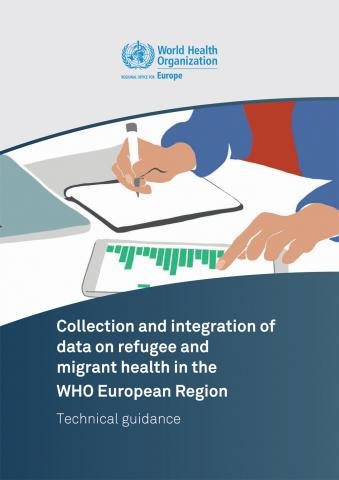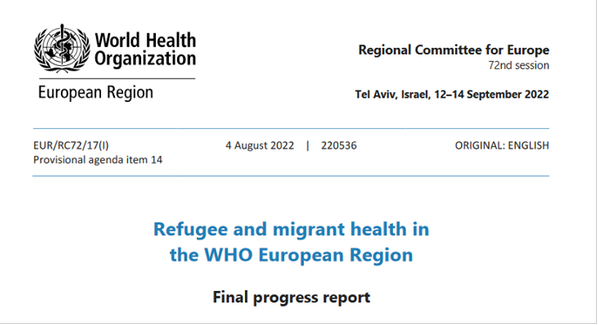WHO COLLABORATING CENTRES - Evidence production and monitoring and evaluation
This section highlights relevant documents that have been produced and published by Global Health and Migration unit (GHM), and WHO jointly, as part of the WHO CC agreement and the greater WHO CC network focused on migration and health.
%20c_1010256-l_1-k_bild-addressing-the-health-challenges-in-immigration-detention.png)
Addressing the health challenges in immigration detention, and alternatives to detention: a country implementation guide (2022)
This country implementation guide outlines current evidence, knowledge and best practices relating to the health and health challenges of refugees and migrants in immigration detention, as well as alternatives to detention. It highlights key principles and international commitments, summarizes the current status and health challenges and provides practical considerations for addressing the health challenges of refugees and migrants in immigration detention, as well as the implementation of alternatives to detention. Specific areas for intervention include providing comprehensive training for staff, ensuring safeguards, providing psychological support and providing tools to prevent the spread of communicable diseases. The guide also promotes engagement-based alternatives to detention.
While the main intended audience is policy-makers across sectors at local, national and regional levels, the guide is also of value for health planners, relevant ministries, international organizations, management of immigration detention facilities and their staff, and researchers.
The guidance, published by the WHO Regional Office for Europe in the framework of the Migration and Health programme was written by a team of authors led by Soorej Jose Puthoopparambil (Uppsala University), co-authored by Laran Matta (Uppsala University), with support from Sara Ghanem and Justine Margaux Zuidberg (Uppsala University).
Download
Press release and video from WHO Regional Office for Europe

Collection and integration of data on refugee and migrant health in the WHO European Region - Technical guidance
This technical guidance outlines current evidence, knowledge and best practices relating to the integration of migration health data into national health information systems. It highlights key principles, summarizes priority actions and challenges, maps existing international commitments and frameworks and provides practical policy considerations for promoting collection and integration of migration health data.
Specific areas for intervention include establishing a multi-stakeholder working group for overseeing data collection and integration, creating a regulatory framework for preventing unauthorized access and use of health data for non-health purposes, integrating core variables into the data collection system and promoting data linkage. While the main intended audience of this technical guidance series is policy-makers across sectors at local, national and regional levels, the contents of this publication will also be of value for health-care practitioners, health planners and health information specialists and law enforcement officials.
The guidance, published by the WHO Regional Office for Europe in the framework of the Migration and Health programme was written by a team of authors led by Soorej Jose Puthoopparambil (Uppsala University), Laran Matta and Eman Ali (Uppsala University).
Download
Video from WHO Regional Office for Europe

World report on the health of refugees and migrants
Health outcomes are influenced by a whole host of determinants. However, refugees and migrants face additional determinants such as precarious legal status; discrimination; social, cultural, linguistic, administrative and financial barriers; lack of information about health entitlements; low health literacy; and fear of detention and deportation. This groundbreaking publication outlines current and future opportunities and challenges and provides several strategies to improve the health and well-being of refugees and migrants. It is an advocacy tool for national and international policy-makers involved in health and migration.
Soorej Puthoopparambil, Head, WHO Collaborating Centre on Migration and Health Data and Evidence, Uppsala University, Sweden, provided methodological and technical guidance on the overall content of the report.
Download

Final progress report on the implementation of the Strategy and Action Plan for Refugee and Migrant Health in the WHO European Region (2016–2022)
This report provides an overview of the progress made in the implementation of the Strategy and
Action Plan for Refugee and Migrant Health in the WHO European Region (2016–2022) and the work done over the last six years. It also describes the new vision and actions going forward.
The WHO Collaborating center at Uppsala University supported the WHO Regional Office for Europe in designing tools to capture the progress in implementing the strategy and action plan in the region and to analyze the collected data.
Download
